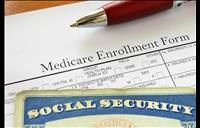
Medicare Part B pays for doctor’s services, whether in their offices, the hospital, your home or other settings, and lab tests, screenings, medical equipment and other supplies.
You will pay a monthly premium, which may be deducted from your Social Security, Railroad Retirement or Civil Service check. If the premiums are not deducted from your retirement or disability check, you will be required to pay premiums quarterly. In 2015, the monthly premium for most recipients was $104.90, though the premiums are higher if your annual income on your individual tax return is over $85,001 or on your joint return it was over $170,001. The highest premiums in 2015 are $335.70 per month.
Once you pay the premium, there is a deductible and a coinsurance amount that you will pay. The yearly deductible is $147, and the coinsurance amount is 20% of the Medicare-approved amount that is charged by the providers.
For example, if you visit a doctor and the doctor accepts assignment from Medicare, the doctor agrees to accept the amount that Medicare has approved for the service. Medicare pays 80% of the cost and you will pay 20%. If the doctor accepts Medicare patients, but not an assignment, the doctor can charge you up to 15% more than the Medicare approved amount and you will have to pay the extra amount unless you have a Medigap policy. If the doctor does not accept Medicare, Medicare will not pay for the service and you will be responsible for the entire amount of the service provided. Medigap insurance won’t pay for the cost of a doctor who has opted out of Medicare.
Do I have to have Medicare Part B? You are not required to sign up for Medicare Part B, but you will be responsible for paying privately for the services covered by Part B (unless you have a Medicare Advantage Plan) if you have chosen not to sign up. If you don’t enroll in Part B when you turn 65 and enroll in Part A, when you do sign up for Part B you may be have to pay a higher premium for Part B. The premium can go up 10% for each 12-month period that you could have been enrolled in Part B. If you have insurance through an employer or have a union group health insurance plan that is your own, a spouse’s or a family member’s (if you are disabled), you do not need to sign up for Part B if that insurance will be the primary insurer. If the plan is not the primary insurer, and Medicare is the primary, you will need to sign up for Part B.
Note that Cobra coverage does not count as employer coverage.